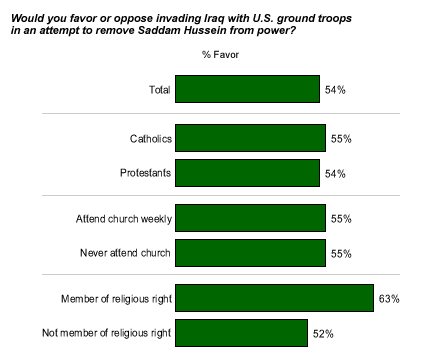Patterns of support for war with Iraq have been fairly predictable. As one would expect, Republicans are more likely than Democrats to favor an invasion, and people who approve of President George W. Bush also tend to approve of war against Iraq. But one group that may seem likely to oppose war in fact does not -- the religiously devout. Although most religions condemn violence, Gallup data show that religiosity itself is unrelated to responses regarding a possible war. In addition, religious affiliation (i.e., whether a person is Protestant or Catholic) does not seem to affect a person's likelihood to favor or oppose war with Iraq. The separate pulls of religious teachings and conservative political inclinations may serve to cancel each other out in this matter.
Casus Belli
The official stances of two of the more prominent U.S. denominations toward a potential war differ.
The United States Conference of Catholic Bishops sent an open letter, signed by its president, Bishop Wilton D. Gregory, to President Bush last September. The letter questioned whether the United States has casus belli, or moral justification for war. "Given the precedents and risks involved, we find it difficult to justify extending the war on terrorism to Iraq, absent clear and adequate evidence of Iraqi involvement in the attacks of Sept. 11 or of an imminent attack of a grave nature."
Later, the president received a different letter from an influential Protestant organization. Using the same theory of casus belli, the Southern Baptist Convention's Ethics and Religious Liberty wrote, "Specifically, we believe that your stated policies concerning Saddam Hussein and his headlong pursuit and development of biochemical and nuclear weapons of mass destruction are prudent and fall well within the time-honored criteria of just-war theory as developed by Christian theologians in the late fourth and fifth centuries A.D."
Casus belli, a philosophy with antecedents in St. Augustine's City of God, is generally presumed when an aggressor will cause lasting, grave, and certain damage. Despite the differing Protestant and Catholic interpretations of casus belli, members of these religious denominations do not differ in their views regarding military action in Iraq. Fifty-five percent of American Roman Catholics favor "invading Iraq with U.S. ground troops in an attempt to remove Saddam Hussein from power." An almost equal percentage of Protestants, 54%, agree*. The numbers change little when limiting the analysis to practicing Protestants and Catholics (defined as those who attend church at least monthly); 53% of each group favors a U.S. invasion of Iraq.
Different Religiosity, Same Purview
It stands to reason that religious devotion might affect philosophy. After all, the faithful commit themselves to church attendance and denominational beliefs. But Gallup data suggest that devotion to a religion doesn't necessarily dictate a commitment to peace, at least not in the case of war with Iraq.
An early October Gallup poll showed 54% of the public supporting an invasion of Iraq (support has been in the mid-50% range since August)**. A similar level of support is found among weekly churchgoers (55%), and people who never attend church (55%). So it appears that religiosity doesn't reduce the appeal of war. In fact, religious fundamentalists are the most likely to support an attack. Sixty-three percent of people who identify themselves members of the religious right support the war, as do 52% who aren't members of the religious right.

Gallup data clearly show that churchgoers tend to be overwhelmingly politically conservative. The data on Iraq show that, in this instance, the tug of war between religious commitment and political leanings winds up at least as a draw, if not a victory for one's political beliefs.
The Sept. 11 attacks were deeply shocking, and may be all the presumption of casus belli much of the American public needs. As long as an invasion of Iraq is seen as an adjunct to the war on terrorism, many Americans -- regardless of their religious devotion -- will find war justifiable.
*The latest results are based on telephone interviews with 1,502 national adults, aged 18 and older, conducted Oct. 3-6, 2002. For results based on the total sample of national adults for each survey, one can say with 95% confidence that the margin of sampling error is ± 3%.
**The latest results are based on telephone interviews with 1,018 national adults, aged 18 and older, conducted Oct. 21-22, 2002. For results based on the total sample of national adults for each survey, one can say with 95% confidence that the margin of sampling error is ± 3%. In addition to sampling error, question wording and practical difficulties in conducting surveys can introduce error or bias into the findings of public opinion polls.
